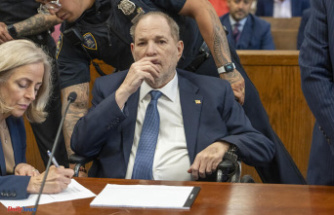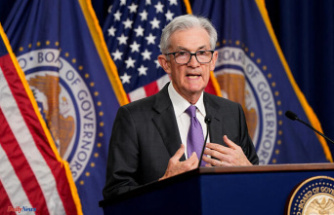In the gas confusion game that Putin is currently playing with the West, Germany is also forced to play along. Last year alone, Germany forwarded around 35 percent of Russian gas supplies to European partners. But now that Gazprom is only pumping 20 percent through Nord Stream 1, "other European countries such as France, Austria and the Czech Republic are also affected," writes the Federal Network Agency in its current management report (as of July 26, 2022). You must now reorient yourself. Some reduce their consumption, others buy from competitors in Norway or Canada. And still others use local resources.
This is how Austria does it. The country is particularly dependent on Russian energy imports and is under severe pressure due to a lack of gas supplies. In 2020, Germany still delivered 8.4 percent of the gas exported to Austria. The Alpine republic is now not only planning to reactivate a disused coal-fired power plant and import liquid gas, but also to tap into a gas storage facility. The storage facility in Haidach, 30 kilometers north of Salzburg, is under discussion. With a capacity of 2.9 million cubic meters, it is one of the largest gas storage facilities in Europe. This corresponds to 95 terawatt hours that are needed annually. For comparison: the German gas storage facilities are only sufficient for a quarter of the required annual volume.
The Haidach gas storage facility is a joint project of the German gas trading company Wingas, its Austrian partner RAG Austria AG and its Russian partner Gazprom export. It was planned, built and operated by RAG. A third of the storage capacity is marketed by the German company Astora. The natural gas storage facility is connected to the German high-pressure network via the German-Austrian gas hub Burghausen/Haiming and is therefore part of the European gas market.
Now that the situation is getting worse, Austria also wants to benefit from the storage facility. This causes annoyance on the southern German side. Will Haidach become the place where Putin's plan to split the European community slowly bears fruit?
Hardly, at least if one is to believe the soothing words of Austria's Energy Minister Leonore Gewessler. "We have always coordinated well with Germany," she said earlier in the week. The fact that Austria is laying claim to the piece of German infrastructure is by no means new. In June, the parliament in Vienna decided to connect all gas storage facilities in the country to the Austrian grid, including Haidach. The Minister of Energy hopes that this will provide a "safety buffer for the winter". Austria's gas storage facilities are currently 50 percent full. According to Austrian media reports, the extent to which Haidach can really help is controversial. Especially since the storage is currently only about 20 percent full, according to the transmission system operator Bayernets. The reason: the storage site is still being supplied by Gazprom.
The Haidach gas storage facility is one of the largest natural gas storage facilities in Europe. It is a joint project of the German gas trading company Wingas, its Austrian partner RAG Austria AG and its Russian partner Gazprom export. It was planned, built and operated by RAG. A third of the storage capacity is marketed by the German company Astora. The Haidach natural gas storage facility is connected to the German high-pressure network via the German-Austrian Burghausen/Haiming gas hub and is therefore part of the European gas market.
But that should change. Federal Economics Minister Habeck and Energy Minister Gewessler are currently trying to find new storage customers. In general, the two have agreed on closer cooperation and have signed a bilateral agreement to this end. Accordingly, both countries want to “support each other and in the sense of solidarity”. Together they want to fill the gas storage tank quickly.
It is therefore clear "that one country does not want to take gas away from the other country," as the gas expert at the regulatory authority E-Control, Carola Millgramm, recently emphasized.
Nevertheless, some already sense a German disadvantage. "We are observing the developments at the gas storage facility in Haidach with great concern," said Bavaria's Prime Minister Markus Söder. Not without criticizing the German-Austrian agreement: "Today we tend to have the impression that something has only changed in favor of Austria. But Haidach is about supplying the whole of Germany. In addition to Bavaria, it also affects Baden-Württemberg and other states."
Söder and his counterpart in Baden-Württemberg, Winfried Kretschmann, fear that the two federal states could look down the drain in the event of a gas shortage. A gas emergency could hit the economy in Bavaria and Baden-Württemberg hard. Among other things, because the south could be at a disadvantage when it comes to gas distribution, as Kretschmann emphasizes.
Due to the distance, the two federal states would be the last to benefit from the liquid gas terminals in northern Germany. "Bavaria and Baden-Württemberg are the last links in the pipeline when it comes to pipelines. If too much gas is extracted in the north (...) that would be fatal," Kretschmann told the daily newspapers "Südwest Presse" and "Badische Zeitung". "If Bavaria, as the economically strongest federal state, is not adequately supplied, this will affect the economy as a whole. Anyone who decouples the south will paralyze the whole country," Söder adds. Statistically, Bavaria and Baden-Württemberg are particularly strong economically. In terms of gross domestic product, the two federal states followed the two city states of Hamburg and Bremen last year. In order to avert the economic damage in the event of a gas shortage, Söder sees the federal government as having a duty.
However, appeasement comes from the head of the network agency. In order to prevent a gas shortage, work is already being done on transporting gas from France via Saarland to the south. And even a spokesman for the Bavarian Ministry of Economic Affairs said on Monday when asked by AFP that connecting the gas storage facility to the Austrian gas network would not cause any bottlenecks in Bavaria.
Although Putin's gas games are causing minor friction, there is probably one person in particular who's head is spinning at the end of the little confusion: that would be the Russian president himself. Despite Bavarian misgivings, his plan to divide the European partners is doomed to fail in Haidach for the time being. Apparently, common values weld together better than chemical liquids.
Sources: Bundesnetzagentur, Astora, Wingas, "Süddeutsche Zeitung", "Der Standard", with material from AFP and DPA












